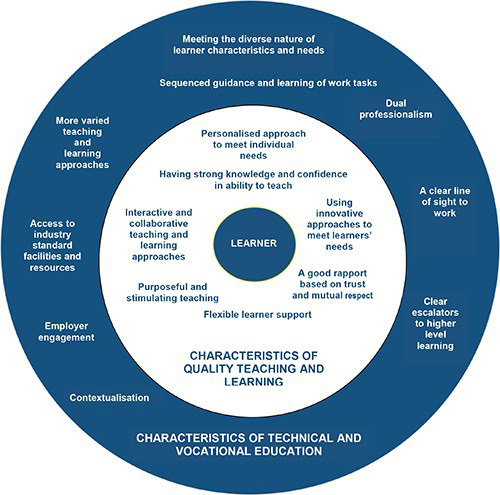‘Technical’, ‘vocational’, ‘professional’ education: what’s in a name?
Friday 18 December 2015
NFER’s recent review of technical education for the Association of Colleges found that there is no universal understanding of what is meant by vocational and technical education. Despite that difficulty, it is possible to isolate the constituent parts of effective vocational teaching and learning, but not for effective technical education.
So what exactly are vocational and technical courses?
The review revealed a lack of universal understanding of what is meant by ‘vocational’ and ‘technical’ education. We did find some agreement about what constitutes effective vocational teaching and learning but there was not enough evidence to identify the components of effective technical education.
The evidence does indicate that teaching and learning in vocational subjects is different from their more academic counterparts. In essence, the characteristics identified in the Commission on Adult Vocational Teaching and Learning report (2013) reflect the need, in particular, for contextualised learning in technical and vocational subjects and highlight the need for teachers and trainers to be informed by up-to-date industry experience and knowledge of current practice. Teachers also need to provide clarity about links with learners’ future occupations and to draw on appropriate learning provision in terms of learning environments and correct sequencing of guidance and learning of work tasks. It’s important that learners are able to apply what they learn to the context in which they will work and that they benefit from the connection to the workplace.
Drawing on the literature reviewed, we developed a model (below) to assist the development of understanding of the characteristics of technical and vocational education and the characteristics of quality teaching and learning. As the review evidence did not attribute exclusive properties to technical education, the model does not differentiate technical from vocational education.

We believe that more widespread understanding of the characteristics and implications of taking technical or vocational courses would help to inform discourse across the education, training and business sectors. Better understanding would encourage employers to get more involved in the development of employability skills of all levels, and would help to inform and further develop the essential features of good technical and vocational teaching and learning. Greater understanding about technical and vocational courses would also help parents and young people appreciate the nature of the courses, how they would be delivered, where they would be delivered and how they might lead to skilled jobs. Ultimately, enhanced understanding about the components of effective technical and vocational courses and improved course provision could contribute positively to the population’s technical skills and productivity.
Indeed, growing a system of employer-led professional and technical qualifications is central to the Government’s plan to improve the UK’s productivity which compares unfavourably with many OECD countries. Fixing the Foundations: Creating a More Prosperous Nation (HM Treasury, 2015) sets out several reforms to achieve this, including the funding of three million high-quality apprenticeships and creating a network of Institutes of Technology, focused on the higher-level skills employers require. The Treasury states that: ‘Professional and technical education provision, of which the majority is currently at Level 2 and below, needs to be refocused to deliver the higher-level skills that employers need’ (p 25). The inclusion of the word ‘professional’ in this context is interesting and perhaps suggests some uncertainty about what ‘professional and technical education at Level 2 and below’ includes and how it can be refocused to deliver the ‘higher-level skills that employers need’.
Where next?
It’s heartening to hear that the government is to provide a high-status alternative (to academic routes) from education to employment. In a recent press release, skills minister Nick Boles said: ‘We want to help young people gain relevant skills by offering them technical and professional courses that are focused on a specific career.’
That professional and technical education appears to be high on the Government’s agenda is encouraging and important if England is to meet its productivity challenges and fulfill the commitment to provide three million apprenticeships. It would be even more helpful if there was greater clarity about what professional and technical education means and how it differs from, relates to, or builds on vocational education.
A year ago NFER published a paper (Changing attitudes to vocational education) that argued for a fundamental change in the way we view vocational education. We argued that changing attitudes is a prerequisite to any increase in uptake. The same is true now. It is great that there is a movement to provide more technical and professional courses but young people need to understand the routes available to them before they can make an informed decision about which one to select.
